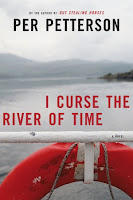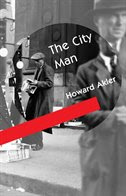 Oh, Julian Barnes, how I adored Arthur & George. From its opening pages right up until the end, it’s a complex mix of the fictional and the historical, a comment on colonialism/literature, and a rollicking good adventure. The novel even encouraged me to download The Adventures of Sherlock Holmes to my iPad (it’s on the 1001 Books list anyway). I’m not quite sure how to alphabetize my ebooks into my reading yet so it might remain unread for some time, but I digress.
Oh, Julian Barnes, how I adored Arthur & George. From its opening pages right up until the end, it’s a complex mix of the fictional and the historical, a comment on colonialism/literature, and a rollicking good adventure. The novel even encouraged me to download The Adventures of Sherlock Holmes to my iPad (it’s on the 1001 Books list anyway). I’m not quite sure how to alphabetize my ebooks into my reading yet so it might remain unread for some time, but I digress.
Told from either man’s changing perspectives, with a few odd other characters thrown in, the novel brings to life to exceptionally interesting characters: Sir Arthur Conan Doyle, creator of Sherlock Holmes, among others and George Edalji, a half-Scottish, half Parsee solicitor wrongly accused of a number of heinous crimes.
Doyle’s a larger than life character — both in the book and in his own mind, to a degree. He’s the prototype for the colonial British man: athletic, sharp, intelligent, opinionated, moral, and just (to his own sense of duty and accomplishment, if that makes any sense — we might question his upstanding “Britishness” under a post-colonial analysis and discover his beliefs lacking a broader, more realized context) and his confidence spills over every page. He marries a lovely woman because he should; and then promptly falls in love with someone else (but never acts upon his feelings in anyway that could be considered ungentlemanly). He strives to clear George Edalji’s name because it’s the right thing to do but doesn’t believe in the suffrage of women. And it’s these contradictions that make him such a fascinating character caught within Barnes’s rollicking story.
George Edalji, a firm believer in truth with a capital “T” finds himself in quite a pickle when the local constabulary arrests him for mutilating animals and sending horrible, harmful prank letters to his own family. George, a solicitor by trade, firmly believes in the good, just righteousness of the legal system. It will save him. What he doesn’t count on is the racism that feeds the decision to imprison him. Even when further animals end up mutilated, there’s a “viable” explanation as per why George is still guilty of the crimes.When Sir Arthur reads about his case in an obscure newspaper, he sets his mind upon clearing George’s name and helping him seek restitution for both his wrongful conviction and his imprisonment.
Even though their lives and personalities couldn’t be more different, when they finally meet, their actions — Doyle’s “investigation” and subsequent attacks in the press and George Edalji’s further insistence of his innocence — challenged and then changed the existing legal system. But it is the personal lives of both men that keep the narrative from feeling dry and/or crisp. Barnes remains rich in his description of their lives, their wants, their needs, their loves (or lack thereof in the case of Edalji). He’s also careful to keep a narrative distance. While we feel and know the racism behind George’s conviction — the staunch way that George himself refuses to believe it had any part in his troubles, how George firmly believes (and was brought up to be) himself to be an Englishman first, remains a fascinating part of his character. Goodness, I enjoyed this novel — its pacing, the characters, the setting, the “investigation,” — all of it. It was a bright and welcome change — to race through a book that you felt was somewhat flawless in terms of its prose and presentation.
I’ve never read any other Julian Barnes. I’m glad there is at least one other on my shelf that will be tackled the next time I reach the British section. It shouldn’t take me too long. I can’t believe that after finishing In the Time of Butterflies, I’ll be back reading Austen again — the last on my shelves.








